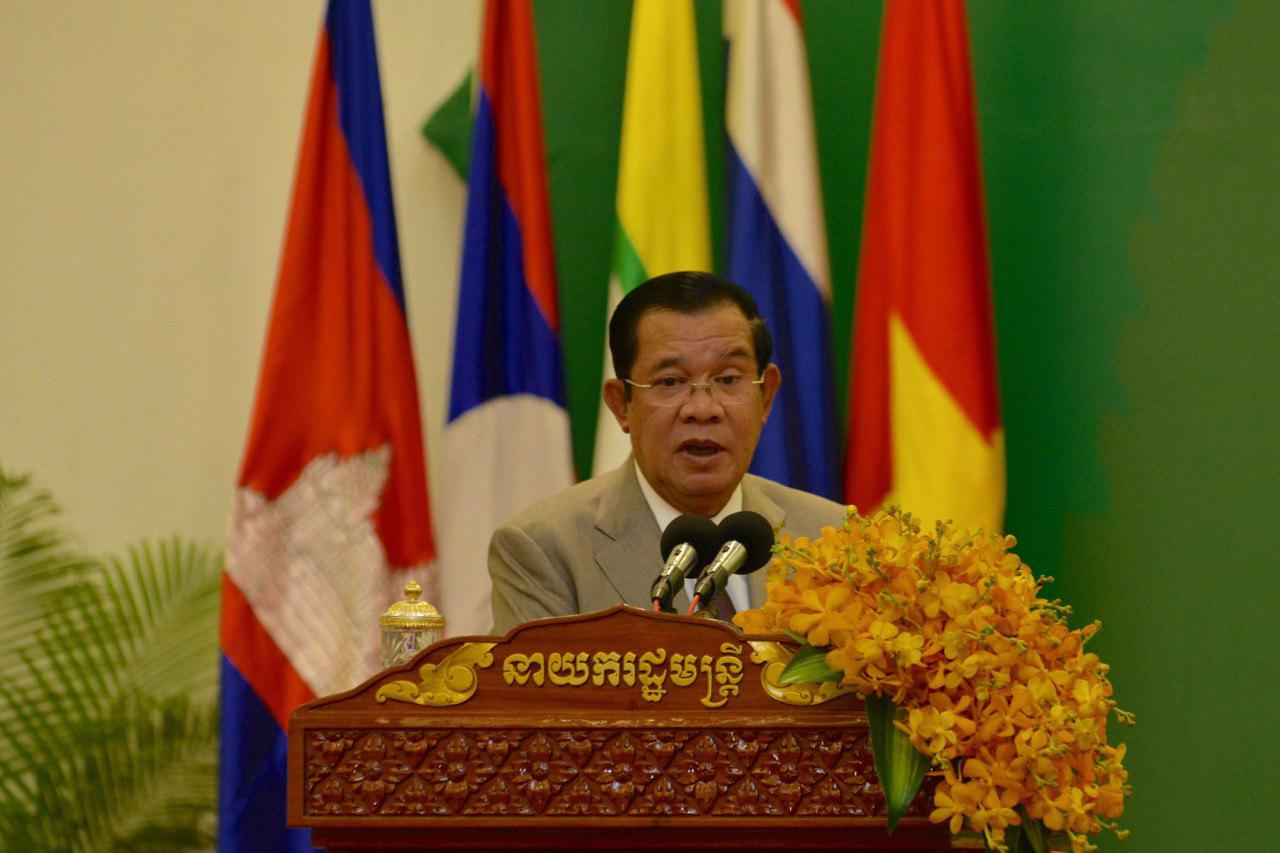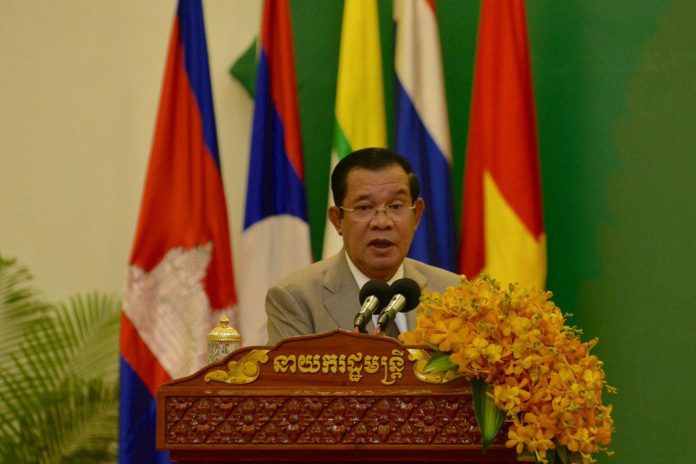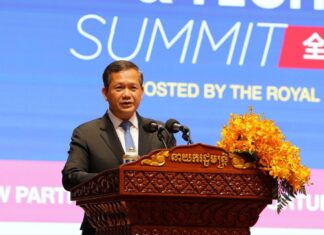Selected Comments Samdech Techo Hun Sen, at the Opening Session of the Third Ministerial Conference on Labor Cooperation among Cambodia, Lao PDR, Myanmar, Thailand and Vietnam (CLMTV): “Towards Protection of Migrant Workers in CLMTV Countries – Cooperation in Social Securities”

In addition to the prepared texts, Prime Minister Samdech Techo Hun Sen made impromptu comments with unofficial selections and translations as followed:
- Samdech, Excellencies Deputy Prime Ministers, Senior Ministers, Ministers;
- Excellencies Labor Ministers of Lao PDR, Myanmar, Thailand, and Vietnam;
- Excellencies Ambassadors, Distinguished National-International Guests;
- Excellencies, Ladies and Gentlemen, and All participants!
Today, I have the great honor and pleasure to participate in this opening ceremony of the “3rd Ministerial Conference on Labour Cooperation in Cambodia, Laos, Myanmar, Thailand, and Vietnam (CLMTV) under the theme of “Toward the Protection of Migrant Workers in CLMTV: Cooperation on Social Protection Sectors”, which is solemnly organized at this moment.
[Impromptu Comments 1]
It has been quite sometimes that we only use this acronym CLMV. Now we have included our Thai friends who is with us in ACMECS, the Greater Mekong Sub-region, and our neighbor. Alphabetically, T (for Thailand) will come before V (for Vietnam). You may have noted that in every meeting as such Vietnam always came last to give speeches. In ASEAN, Brunei is before Cambodia and Cambodia stands second among ASEAN countries alphabetically.
[End of Impromptu Comments 1]
I would like to express my warm welcome and appreciation to Excellencies, Labour Ministers of Laos, Myanmar, Thailand, and Vietnam, Excellencies, Ladies and Gentlemen, Distinguished National-International Guests, who are present in the land of Siem Reap, the rich area in world heritage and the city of wealth and wonder of Khmer Empire during the Angkor period.
Taking this opportunity, I would like to express my appreciation to the Ministry of Labour and Vocational Training that has had good collaboration with relevant ministries and competent authorities in organizing these significant meetings of 5th Senior Officials’ Meeting and 3rd Ministerial Conference on Labour Cooperation in Cambodia, Laos, Myanmar, Thailand, and Vietnam (CLMTV).
On behalf of the Royal Government of Cambodia, I would like to congratulate on the progress of the labour cooperation in CLMVT that has provided appropriate job opportunities, and addressed high attention on the protection and promotion of migrant workers’ rights in accordance with 2007 ASEAN Declaration on Protection and Promotion of the Rights of Migrant Workers in Cebu, the Philippines, and 2017 ASEAN Consensus on the Protection and Promotion of the Rights of Migrant Workers in Manila, the Philippines.
Nowadays, employment migration has become a global current that has had influence across countries in the world. So far, employment migration has increased only between the neighboring countries while nowadays, with the modern and loaded means of receiving information in the world as well as the easier and cheaper transportation, people have been given more possibility and ease to migrate for employment opportunity in the foreign countries.
In fact, CLMTV countries always address attention on the well-being of migrant workers through the implementation of protection and respect for rights and working condition policies in compliance with ASEAN standard and international treaties by considering the implementation of labour rights and social protection as the implementation of human rights. Meanwhile, the cooperation of CLMTV has also introduced the initiative on mobility of social protection for migrant workers in order to provide more possibility for workers to benefit from social protection regime, despite the mobility of their work from one country to another country. This is the joint goal of CLMTV as well as ASEAN community and other countries in the world that have been implemented.
Therefore, as one of the members of CLMTV labour cooperation, Cambodia would like to support this initiative through the introduction of various policies and regulations on the protection of rights and benefits for both Cambodian migrant workers in foreign countries and foreign migrant workers in Cambodia. At the same time, Cambodia has also been implementing bilateral agreement on labour cooperation with other countries among the 4 friendly nations in order to contribute in the implementation of the Cebu ASEAN Declaration and Manila ASEAN consensus, which is the jointly agreed objective of the CLMTV countries on the mobility of social protection regime, which has accomplished in the past.
[Impromptu Comments 2]
New Tendency for Workers Abroad
Let me have your attention from this forum on a new tendency in our world. Previously, traveling from one country to another, especially in the time of cold war, had not been that simple. As the cold war subsided, I noticed that a number of countries started to welcome foreign workers from other countries. Vietnam has had this experience in sending their workers to the former Soviet Union and other Eastern European countries. As for the present tendency, since there is a better integration in the region, sub-region, and with many partnering countries, while there are information on jobs markets available coupling with more convenient means of transportation, people are seeking for jobs opportunities. We have noticed that there are growing number of aging people in some countries that creates jobs (in caring of the aged) for younger population from other countries. Take for instance in Japan, regulations have been relaxed for foreign workers to come work in Japan. South Korea sends many of theirs to Japan.
Thailand Receives Migrant Workers In and Send Thai Workers Out
We are talking in the framework of five countries no matter in what group we are talking about whether ACMECS or Greater Mekong Sub-region, to include just China and Asian Development Bank (ADB). We are talking now in the case of five countries, which is a part of wider cooperation among ASEAN nations. In ASEAN, countries with shortage of labor could be Brunei, Singapore and Malaysia. Other member countries have their own labors. Take for instance Thailand, even if it receives migrant workers from Cambodia, Myanmar and Laos, Thailand also sends its workers to countries where their skilled labor would earn more. It has been a normal development. Upon meeting with (Malaysian) Prime Minister Mahathir Mohammad, I learnt from him about many migrant workers working in Malaysia, Thai workers also included. In any instance, we must accept that among Cambodia, Laos, Myanmar, Thailand and Vietnam, Thailand is leading in taking in migrant workers – mostly from Cambodia, Myanmar and Laos. There are jobs available out there and it has a correlation to many things. Should Thailand stop receiving migrant workers, its economy is going to fall because of shortage of labor.
Some Criticize Finding People Jobs Abroad as Sending Them Work as Servants
I know it is not only the case of Cambodia. As far as I know, Myanmar, Laos, and Cambodia are working in cooperation with Thailand on status of workers turning them from illegal migrant workers to legal ones. I do not what happens in your countries but in mine, helping people find jobs opportunity abroad like in South Korea, Japan, Malaysia, Thailand, Singapore, etc. received criticism for sending people to work as other peoples’ servants […] jobs area available either local or abroad and everyone has to have a job to make a living. Helping people to migrate for jobs has become an issue that some blaming us for lack of jobs inside the country and sending people to work as servants. In fact, searching for jobs for people has been an effort excelled by ASEAN, in which the Philippines has the most workers working abroad.
ASEAN Leaders Discussing Migrant Workers
You may have known already that there have been two decisions made regarding migrant workers in the Philippines. In 2007, in Cebu, I was there. In 2017, in Manila, I also was present. I may raise one development for you to think of. In 2003, Cambodia chaired ASEAN in 2002 and the whole 2003. There was this SARS breakout. We convened urgently a meeting and Thailand then hosted the meeting […] I discussed the matter on phone with former Prime Minister of Singapore Goh Chok Tong and former Thai Prime Minister Thaksin Shinawatra. There was also a meeting with the People’s Republic of China and then Chief Executive of Hon Kong Tung Chee-hwa.
We raised the matter straightforward to each other that should anyone found infected (with SARS), s/he must be treated until s/he was fully recovered with help of the country s/he was in. (Maria Gloria Macaraeg Macapagal-) Arroyo, then President of the Philippines proposed that after being treated, respective country should also find her/him jobs. (Tun Haji Abdullah bin Haji Ahmad) Badawi then representing Prime Minister Mahathir Mohammad of Malaysia said in response to the proposal recovering them from sickness was already an uphill battle not to mention finding them jobs. It is not a new thing. Some have judged Cambodian migrant workers opponents to the Royal Government and/or chased-out of the country to find jobs abroad […]
Workers’ Logbooks to Gain Retirement Benefits
I may share with you that in late 2017 and in 2018, I met with nearly one million workers. The many points that you are discussing are relating to social protection (for migrant workers) from one country to another. Cambodia is in its work of observing jobs transferring (and continuity). Workers entitles to retirement benefits must have their jobs logbooks recording their jobs engagements […] for instance after working in one factory for a certain period of time like five years, the factory closed. S/he could transfer to another factory and has to bring along her/his job logbook to register continued actions for the sake of receiving benefits after s/he retired. We are also seeking to enter an agreement with partner, for instance, we already did it with Thailand, to keep track of migrant workers jobs engagements […]
Should we achieve this, we would realize this goal of “One ASEAN, One Identity, and One Community” for the sake of our peoples […] as you can see, these are not simple matters. On the one hand, we must think about immediate economic interests of every countries involved and on the other hand about long-term interests and benefits of workers. We may bring this matter up for discussion in ASEAN about how to ensure continuity of jobs tracking to ensure access to social retirement benefits.
Aung San Suu Kyi’s “Let’s Go Home”
Months ago, HE Aung San Suu Kyi visited Cambodia. You may have remembered that after winning the elections she conducted a visit to Thailand where she said to Myanmar workers “let’s go home.” The opposition parties in Cambodia then attacked me on this issue. They said leaders of other countries called their peoples back to their countries while in Cambodia we sent (workers out to other countries) […] I asked HE Aung San Suu Kyi if the Myanmar workers have returned to their country (leaving jobs in Thailand) and she said “no” because labor cost in Myanmar is still lower than in Thailand […]. There are two issues here – (1) would Myanmar be able to find jobs in the country for roughly two millions workers in Thailand? […] and (2) they earn more working in Thailand than working in their own country […]
High Pay and Better Accommodations and Schooling for Children
On the contrary, Cambodia has had the ability to reverse this. We are in shortage of workers in agriculture because many have chosen to migrate for jobs abroad. The pay rate in Thailand and in Cambodia has now drawn to smaller gap and working in home country would help minimize expenses. In the time to come, we are going to excel on my recommendations with regard to improving workers’ (1) salary and (2) accommodations and schooling for their children. The central point is to guarantee migrant workers receiving care and rule of law from recipient countries. We seek to ensure integration and continuity of social security regime in respective recipient countries when workers returned to home country. We are addressing the issue for workers both inside and abroad when they returned.
Searching for job opportunity for people is a big issue for every country. Some countries has a high unemployment rate and some faced with labor shortages. In general, we must work together to address the problems […] I visited countries in the Middle East and I met with workers going there from ASEAN countries. They were happy to see us […] it is a good thing that we can meet here in Siem Reap province to discuss related challenging issues in the frameworks of the five countries, and also in ASEAN as a whole […]
[End of Impromptu Comments 2]
- Samdech, Excellencies, Ladies and Gentlemen, and All Participants!
Cambodia is truly honored to be the host of this important meeting which is in parallel with the introduction of employment migration policy of the Royal Government of Cambodia in coherence with the Rectangular Strategy-Phase IV: Growth, Employment, Equity andEfficiency, which provides priority on all sectoral reforms and some new policies introduced that focus on national social protection policy and the protection of migrant workers.
To implement the national social protection policy, the Royal Government of Cambodia has developed the social protection regime and social assistance system. For the social protection regime, the Royal Government has paid attention on government officials, private sector employees with the establishment of social insurance regime on aging welfare, death and employment risk management in order to ensure income security, increase work production and social justice.
As the result, Cambodia has launched the process of employment risk regime, health care and retirement salary that covers nearly 100% of employees and officials in enterprise, production institutions, service and public sector. Meanwhile, Cambodia is formulating and implementing law on social protection in 2019 in order to expand more scope to people that are self-employed and migrant workers. With this social protection regime, Cambodia has established the social protection system in order to help the development of social welfare to workers, employees and public officials more effectively and transparency.
[Impromptu Comments 3]
Women in Pregnancy Benefits
On this point, let me emphasize to Excellencies and Ladies from the four countries present here with us that Cambodia is prioritizing in its social protection policy on helping female workers with pregnancy. For a female worker delivering a baby in Cambodia, she is entitled to a three months leave from work with pay of 120% of her working salary. The state also provides her with a supplement of 100 USD and will multiply with number of babies she may have at one delivery. We are extending such benefits from female civil servants and armed forces to covering female workers in private factories. We are also aiming to address similar need in four stages to women in poor households from the time she starts her pregnancy through to the time she is delivering. From the delivery to the time when her baby is two years old, a mother is entitled to a supplement eight times. For this effort to guarantee safety and enhance gender equality, the state would spend roughly 200 million USD. We have provided medical consultation and treatment free of charge for workers. Cambodia should be making a leading step. Foreign workers working in Cambodia should be entitled to similar treatment free of charge too. We have already done that and we are seeking other countries doing the same to the Cambodian workers working there.
[End of Impromptu Comments 3]
- All Participants!
In order to achieve with the draft of Siem Reap Declaration on the roadmap to Joint Declaration of Labour Ministers on the mobility of social protection regime for the migrant workers of CLMTV countries, and on behalf of the Royal Government of Cambodia, I would like to support the theme of “Towards the protection of migrant workers in CLMTV countries: cooperation on the social protection sectors”. In this regard, I would like to share some recommendations to all participants as follows:
First, all CLMTV countries shall discuss and share experience based on national policies, national laws, international laws and flexibility in the context of each country in order to reach the Joint Declaration on the mobility of social protection regime for migrant workers in CLMTV countries.
Second, CLMTV countries shall utilize various discussion mechanism under both bilateral and multilateral frameworks in order to achieve the Joint Declaration on the mobility of social protection regime for migrant workers in CLMTV countries as planned.
Third, CLMTV countries shall jointly strengthen and expand the implementation of labour cooperation to be more in-depth with stakeholders in order to ensure the protection of rights and benefits of migrant workers with effectiveness and transparency.
I strongly hope that the close cooperation between the Royal Government of Cambodia and the Governments of other friendly nations, and development partners will be accelerated with effectiveness in order to achieve the sustainable development goal of United Nations and joint progress of CLMTV.
To this end, with the Opening of “the 3rd Ministerial Conference on Labour Cooperation in Cambodia, Laos, Myanmar, Thailand, and Vietnam (CLMTV), I would like to wish the conference the fruitful outcomes, and wish Samdech, Excellencies, Ladies and Gentlemen, Distinguished National-International Guests, all the best of health, good and unforgettable memories during your stay in this famous Angkor territory of the Kingdom of Cambodia.
Thank you!






![Special Lecture by Samdech Akka Moha Sena Padei Techo HUN SEN, President of the Senate of the Kingdom of Cambodia, on “Leadership Experiences and Vision for Peace” to the 11th Plenary of the International Parliament for Tolerance and Peace (IPTP) [Unofficial Translations]](https://pressocm.gov.kh/wp-content/uploads/2024/12/468161445_1188047276010391_3141496335218348185_n-100x70.jpg)
